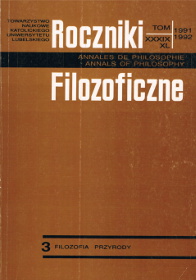The Principle of Methodological Positivism and the Problem of Unification in Philosophy
Abstract
The paper describes the methodological growth of modern science toward the so-called principle of methodological positivism. This principle implies important epistemological distinctions between the natural sciences, metaphysics and theology. Consequently, it allows to introduce neither metaphysical nor theological explanations to fill the gaps in physical theories. The principle of methodological positivism played an important role in overcoming the cognitive patterns adopted in the physico-theology of the XVIII century. At the present time, however, its importance is called into question by adherents of the "new biology" and "new physics" who undertake metaphysical issues in the context of scientific theories. After critical assessment of this new practice, the author develops his proposal of unification in philosophy. In his approach, philosophy should be an epistemologically autonomous discipline open to new scientific results.
Copyright (c) 1992 Roczniki Filozoficzne

This work is licensed under a Creative Commons Attribution-NonCommercial-NoDerivatives 4.0 International License.





